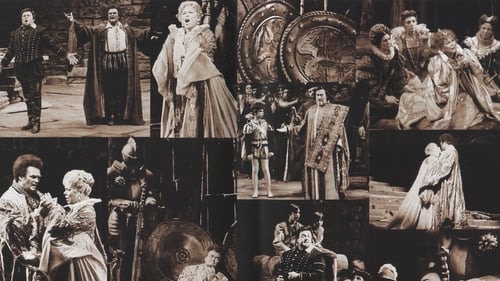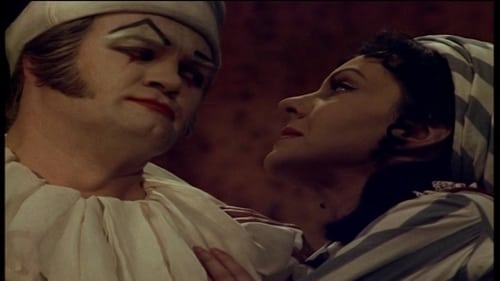Jon Vickers
Birth : 1926-10-29, Prince Albert, Saskatchewan, Canada
Death : 2015-07-10

Self (archive footage)
With a career that includes a 35-year tenure as composer of the Berlin Philharmonic and record sales topping 200 million, Herbert von Karajan is one of the most legendary figures in 20th-century classical music. Comprised of archival footage, performance highlights and interviews with the likes of Anne-Sophie Mutter, Christa Ludwig and Seiji Ozawa, this retrospective chronicles the life and times of the iconic Austrian maestro.

Benjamin Britten's powerful opera Peter Grimes is considered to be one of the masterpieces of the 20th century. In this famous production by Elijah Moshinsky for The Royal Opera, filmed in 1981, Canadian tenor Jon Vickers stars as the complex and misunderstood fisherman, with Heather Harper as Ellen Orford and Norman Bailey as Bulstrode. The conductor is Sir Colin Davis, who worked for several years with the cast of this production, resulting in a masterly interweaving of characters in this gripping drama. Elijah Moshinskys production for The Royal Opera was inspired by early Victorian photographs taken of the Suffolk coast and presents his action on a sparse stage, evocatively lit and dominated by strong performances. Canadian tenor Jon Vickers is one of the greatest Grimes of all. This is a towering performance, rough and terrifying, yet beautifully sung in the lyrical passages.

Florestan

Jon Vickers was one of the most magnetic singing actors of the 20th century and Otello one of his greatest roles. He understood how to combine Shakespeare’s rich characterization and Verdi’s dramatic music to create an overwhelming figure, one whose death left audiences deeply shaken. Vickers is perfectly partnered by James Levine’s conducting and the Met’s sensational orchestra and chorus. Renata Scotto is an appealing Desdemona, Cornell MacNeil is a menacing Iago, and Franco Zeffirelli’s production is deservedly legendary.

Vasek
This MET production of Bedrich Semtana's classic folk opera boasts a superb cast, including Nicolai Gedda, Jon Vickers, Teresa Stratas, and Marti Talvela. The staging and mis-en-scene is traditional and very well done. Everyone seems to be enjoying this presentation. Although not to the same standard as today's HD productions, this is still a wonderful way to get to know this delightful opera.

Pollione
Oroveso, a Druid High Priest, gathers his people in a sacred forest and prays to their gods for help in vanquishing the Romans who have taken over Gaul. Unbeknownst to Oroveso, his daughter, Norma, a High Priestess, has for some time been the lover of Pollione, the leader of the Romans; she has, in fact, not only broken her sacred vow of chastity but has borne two children to the warrior. Norma uses her position to dissuade the Gauls from attacking the Romans, claiming that the gods have told her that the time is not favourable. Recorded at Théâtre Antique d'Orange, 1974

Tristan
Birgit Nilsson and Jon Vickers star in this filmed record of the Theatre Antique d'Orange's acclaimed 1973 production of Wagner's epic tale of doomed love in the Middle Ages. Tristan und Isolde also features the Orchestre National de R.T.F., under the direction of Karl Bohm.

Otello
Herbert von Karajan directed this film of Verdi’s Shakespearan masterpiece as well as conducting the Berlin Philharmonic. As the tragic Moor of Venice, arguably his greatest role, John Vickers (in the words of critic David Cairns) "commands both the notes and the moral grandeur of the part. … And he has the aura of greatness – greatness of heart, of bearing, of musical and dramatic conception". Mirella Freni is a heartbreakingly lovely and fragile Desdemona, while the fine English baritone Peter Glossop plays the villainous Jago.

Canio
Opera's most popular double bill, fondly known as Cav and Pag, can be a tawdry mess or, as in this performance of Pagliacci, a searing experience. Its power derives from an all-star cast headed by tenor Jon Vickers in the double role of betrayed husband, Canio, and tragic clown, Pagliacci. Hes a singer who blurred the division between reality and stage illusion in every role he assumed, thus taking an opera about that thin line between real life and stage artifice to heightened levels of intensity. Vickers is a force of nature, his big, brawny voice suffused with emotion. Here, his phrasing, textual precision, and timbral colorations expand the scope of the opera, making a moving tragedy out of Leoncavallos verismo melodrama.

Don José
This spectacular opera film was taped in 1967 and is based on the 1966 Salzburg Festival production directed by Herbert von Karajan himself, who also conducts the fabulous Vienna Philharmonic Orchestra. The production features the three greatest exponents of their respective roles at the time: Grace Bumbry’s magnificently seductive-toned Carmen, Mirella Freni’s ineffably lovely, touching Micaëla and Jon Vickers’s thrillingly manic-depressive Don José. On its release the film was hailed by Die Presse, (Vienna) as a “unique artistic event”, while Le Monde felt that Karajan’s production brought “a whole new dimension” to the opera, “combined with a magisterial interpretation”. A classical and utterly dramatic approach to probably the world's most beloved opera – Karajan’s Carmen is as much a delicacy for opera fans as it is a perfect starter for newcomers.








